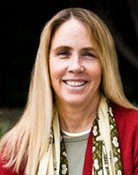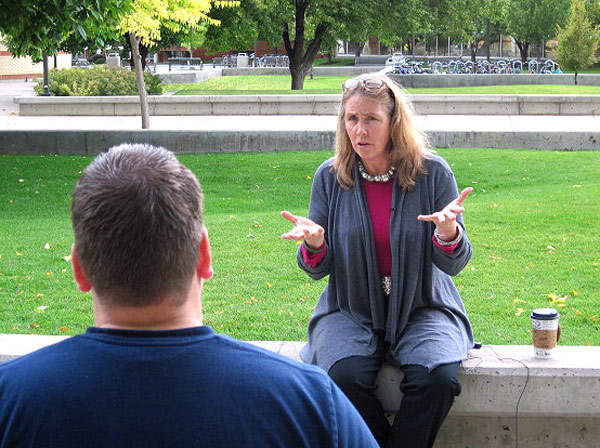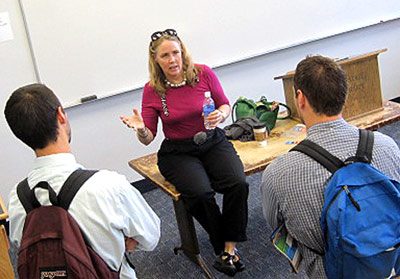‘Find out what your passions are,’ journalist says. No ‘master plan’ needed
October 7th, 2010 Posted in OpinionBy Storee Powell
LOGAN—For someone without “a master plan” for her life, National Public Radio ombudsman Alicia C. Shepard has found ways to stay busy. She has written three books, teaches media ethics at Georgetown University, and received the National Press Club’s top media criticism prize three times.
 Shepard visited Utah State University this week to talk to journalism students about her life and work. Click here for a story on her Morris Media & Society Lecture on “The Promise and Perils of Social Media.”
Shepard visited Utah State University this week to talk to journalism students about her life and work. Click here for a story on her Morris Media & Society Lecture on “The Promise and Perils of Social Media.”
• Other Links: Listen to Shepard’s interview on Utah Public Radio with Lee Austin. And see her post about visiting USU on National Public Radio.
“I was not a person with a plan growing up,” she told a classroom of reporting students on Monday. “That’s the message I want to get across to you. I followed my passions, and did things I wanted to do that were stimulating. I woke up every morning feeling excited about what I was going to be doing.”
Shepard says she didn’t grow up wanting to be an “ombudsman” or to complete a bachelor’s degree in English, or a master’s, for that matter. She originally set out to work in advertising and realized she hated it, so she looked into doing an environmental program at Georgetown University.
However, that option looked better in the brochure than in actuality, she said.
“I wanted to major in English, but I felt like that was too unsure,” the New Jersey native said. “Even back then we were all freaked out about what are we going to do with this ‘education’ and how can I get a job.”
then we were all freaked out about what are we going to do with this ‘education’ and how can I get a job.”
It was an “accident” involving a want ad for a clerk at the National Press Club in Washington, D.C., that diverted her from a career as a high school English teacher. She answered a classified ad and went to work as an office assistant part-time at Scripps League Newspapers in Washington, D.C., hired by Lee Roderick, a USU development officer, biographer and “Friend of JCOM,” says JCOM professor Ted Pease.
After graduating, Shepard applied to Cornell University in hopes of getting a master’s degree in English so she could teach high school. But as it turned out, Shepard said she began to like her newspaper job more and more.
“I am eternally grateful to Lee Roderick because he saw something in me that I didn’t see in myself, which is I am a hard worker and I’m incredibly nosey,” Shepard said, “or ‘curious’ is a nicer way to put it.”
Shepard said Roderick had her rewrite press releases and develop her journalism skills. She was a student at Cornell when she was offered a fulltime job at Scripps League Newspapers’ Washington bureau.
“So I thought, ‘What the heck? I will do that for a year and then I will go to graduate school.’ Well, I never went to grad school, and I did that job for four years,’” Shepard said.
But Shepard says she felt over her head in the newspaper position because of the work atmosphere and her lack of reporting experience.
“It was the late ’70s, and there were very few women in the newsroom. It was mostly middle-aged white men who were there as the capstone to their career,” Shepard said. “I really didn’t know what I was doing, I felt I needed to go out and work at a newspaper.”
So following her passions once again, Shepard bought a car and drove west. Ending up in Santa Fe, Shepard landed a job at the Albuquerque Journal. During her time there, she fell in love and had a choice of staying in New Mexico or following her new husband to work at the San Jose Mercury.
“These decisions mark important turning points in people’s lives,” she said. “A decision like that tells you a lot about a person and the choices they had to make.”
Shepard started at the San Jose Mercury in 1982, filling in as a six-month temp for someone on maternity leave.
“I thought, ‘I am going to make you want to beg me to stay,’ and that in fact is what happened” she says. “There is no doubt that when you start a job you have to give it 150 percent.”
She and her husband were living on the 32-foot sailboat, the Yankee Lady, when she got pregnant and “came ashore to breed,” living in San Francisco with their new son, Cutter—named for their cutter-rig sailboat. When Cutter was 9 months old, the couple went back to the sea and quit their jobs to sail the South Pacific.
While they sailed the Pacific over the next three years, Shepard wrote a column for the San Jose Mercury, “Letters from Paradise,” which Shepard says was really a travelogue of what her family had been doing and how they managed to survive at sea with a baby.
“Why we decided to ‘retire’ in our 30s was because both of our fathers had died of heart attacks in their 60s, and we felt we wanted to do this while we are young and still able to jump off the boat.”
 In 1990, Shepard and her family ended up living in Japan after selling the boat, staying for two years while they learned to speak Japanese and taught English.
In 1990, Shepard and her family ended up living in Japan after selling the boat, staying for two years while they learned to speak Japanese and taught English.
The family had been gone from the United States for five years, returning to Washington, D.C., in 1992, when Cutter was 6.
“I wanted to freelance so I could be a mom,” Shepard says. “I had a friend of a friend who worked for American Journalism Review, and he provided me freelance work.” AJR, published at the University of Maryland, is a trade magazine that focuses on journalism and press issues.
Ethical lapses in journalism and media were the focus of Shepard’s work that won her awards from the National Press Club, and ironically sent her traveling again when she was asked by the Newseum, a D.C. museum dedicated to news run by the Freedom Forum, to write book about how journalists are portrayed in movies.
But 9/11 scrapped that plan, and Shepard turned to a book about how journalists covered the terrorist attacks of 2001.
“The news industry was the keeper of the calm that day, because they continued to provide information” Shepard said. “When you are in a scary situation, the more information you have the more you are able to feel calm.”
The book explains how the news played a key role that day, Shepard said, as well as the logistical, ethical, legal and emotional challenges journalists faced in reporting 9/11. The book, release in 2002, was titled Running Towards Danger: Stories Behind the Breaking News of 9/11.
Shepard said the book’s title came to her after she’d interviewed New York Daily News columnist Rod Dreher.
“I asked him if his wife had asked him to not cover 9/11 on the scene, and he said, ‘My wife knows there are three types of people who run towards danger: policemen, firemen and journalists.”
Since then, Shepard has taught journalism ethics at Georgetown University, written for a variety of news outlets including Washingtonian magazine, The Chicago Tribune, The New York Times, The Los Angeles Times, The Newark Star Ledger and The Washington Post.
And she’s written two more books: Narrowing the Gap: Military, Media and the Iraq War in 2004, and Woodward and Bernstein: Life in the Shadow of Watergate in 2006.
While touring the country to talk about her latest book, Shepard said people asked her what she would do next.
“I told them I just wanted a job with a direct deposit because I had split with my husband,” she says. “I was living off the book advance and teaching. Then I found the position for NPR’s ombudsman, and it just pulled everything together I had been doing.” As ombudsman for national public radio, Shepard pays close attention to the news and the performance of journalists, especially those at NPR’s Morning Edition and All Things Considered, and other national news programs. The job of a news ombudsman is to “provide transparency” for listeners about how the news is reported, and Shepard’s background as a reporter about the media and a teacher of ethics made it a good fit.
Though largely unplanned, Shepard’s background had made her an expert on media practices, media ethics, and a wide range of news industry trends and practices.
“I became the voice for the powerless by listening to questions and concerns of NPR listeners,” Shepard said. “I am their voice.”
Her experience both in journalism and in life makes her a good intermediary between news consumers and journalists.
“I haven’t been selfish about things, but life is short” she said. “I volunteer and give back, but I did not have a master plan.
“If you get the chance to live overseas, do it. I wasn’t making a mistake by not finishing college in four years. Do internships to learn what you like and don’t like. Go find out what your passions are.”
TP
Tags: Alicia Shepard, journalism ethics, Morris Media & Society Lecture

1 Trackback(s)
Sorry, comments for this entry are closed at this time.